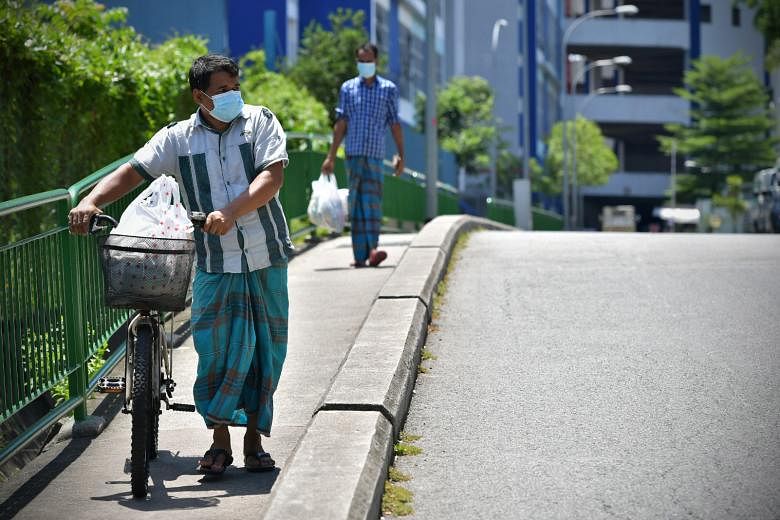I realised recently that I've never had a real conversation with a migrant worker, not one where we talk to each other as equals.
This came as a rude surprise, since I've always thought of myself as rather enlightened when it comes to such matters. After all, back in 2008 when I lived in Serangoon Gardens, I had refused to join my neighbours in signing a "not in my backyard" (Nimby) petition against the construction of a foreign workers' dormitory in our estate. I had asked readers then to consider how they would feel if they or their child were treated likewise in another country.
But my views on and behaviour towards the migrant workers living in our midst have shifted little in the last 12 years. Fortunately, some of my fellow Singaporeans have moved faster and further towards greater solidarity; and it is thanks to the Welcome In My Backyard (Wimby) team that I got to be part of a discussion with two migrant workers as panel speakers.
For the first time, I heard for myself - via Zoom - a migrant worker speak about his encounters with some Singaporeans who made him feel like an alien.
"I really don't want to highlight all these things... if you go on the MRT or somewhere else, some locals really react differently," said Mr Ripon Chowdhury, who is in his early 30s. He has been here since 2010 and works in quality control at a shipyard.
"So if suddenly, we shift to an HDB estate," the activist and blogger added, "they may think that these people are coming from a different planet. I just want them to welcome us as a friend, as a neighbour, as they treat others, and not feel that we are people coming from dorms, dirty places."
The Wimby campaign was launched last month by a group of volunteers to encourage Singaporeans to welcome migrant workers relocated from dormitories to Housing Board estates as part of efforts to curtail the spread of the coronavirus.
Wimby's Backyard Conversation, held on May 2, featured Mr Chowdhury and his Bangladeshi compatriot Islam Rockybul as panellists.
Mr Rockybul is chatty, smiles a lot and is a safety coordinator at a construction site in Fernvale.
"Every day, I receive a call from my home but once, one of my Singaporean friends asked me: 'Rocky how are you?' " he said.
"You don't know how I feel at that time, that someone in Singapore cares about me and is really asking, 'Rocky how are you?' It made my energy level very high."
At which point, he was asked by forum moderator and Wimby campaign co-leader Nicholas Oh: "So how are you feeling now, Rocky?"
To which he replied: "Right now, I can express and even share on behalf of our migrant community, it feels really great."
Referring to Mr Oh, his fellow moderator Jennifer Lim Wei Zhen of Wimby and panellist Seema Punwani of non-profit organisation (NPO) Transient Workers Count Too, Mr Rockybul added: "I don't know Nick, I don't know Jennifer. I don't know Seema. We are from different countries, but for now, I feel we are like a family."
MAKE THE FIRST MOVE
So what did I learn from Wimby's Backyard Conversation?
I learnt that I can enlarge my heart.
To do that, I need to keep working at becoming more generous and respectful in how I treat migrant workers.
Singaporeans can make the first move to reach out to migrant workers, said panellists Goh Wei Leong of HealthServe and Ruchi Trivedi of ItsRainingRaincoats, both non-profit organisations.
On migrant workers moving to stay in HDB estates, Dr Goh said: "Both sides are feeling strange. So I think we should just make the first move, be generous, start the conversation and I think the more conversations and friendships are formed, the better it is for all of us."
That invitation gave me pause, for a handful of migrant workers live next door to my parents. We've passed them food, especially when we have more than we can finish, but never did it occur to me to invite them over for a drink or a meal. Perhaps it will be time to, when the circuit breaker is lifted and it's safe for us to socialise once more.
As human beings, we are all social creatures and long to be welcomed, accepted and cared for.
Too often in Singapore, the discussion about how best to house migrant workers is couched in terms of their utility and the associated costs of their labour, not their humanity. Yet, surely the latter comes first.
"Where, after all, do universal human rights begin?" asked Mrs Eleanor Roosevelt, who as first chairman of the United Nations Commission for Human Rights oversaw the drafting of the Universal Declaration of Human Rights, adopted by the UN General Assembly in 1948.
"In small places, close to home," was her reply, "so close and so small that they cannot be seen on any maps of the world.
"Yet they are the world of the individual person; the neighbourhood he lives in; the school or college he attends; the factory, farm or office where he works. Such are the places where every man, woman, and child seeks equal justice, equal opportunity, equal dignity without discrimination.
"Unless these rights have meaning there, they have little meaning anywhere. Without concerted citizen action to uphold them close to home, we shall look in vain for progress in the larger world."
LEADERS NEED VALUES
This pandemic has shone a harsh spotlight on the living conditions of migrant workers here.
We need to face reality, do an honest review and commit ourselves to doing better by these workers.
Singapore's leaders need to show the way, not hide behind the worst instincts of those who prefer to keep things as they are for their own benefit.
"Leadership means influencing the community to face its problems," writes leadership professor Ronald A. Heifetz, whose course on adaptive leadership at Harvard University was one source of inspiration when Deputy Prime Minister Heng Swee Keat launched Our Singapore Conversation.
"Progress on problems is the measure of leadership," Prof Heifetz writes in his book Leadership Without Easy Answers. "Leaders mobilise people to face problems, and communities make progress on problems because leaders challenge and help them do so. If something goes wrong, the fault lies with both leaders and the community."
And if things go right, both leaders and the community deserve credit for meeting the challenge together.












